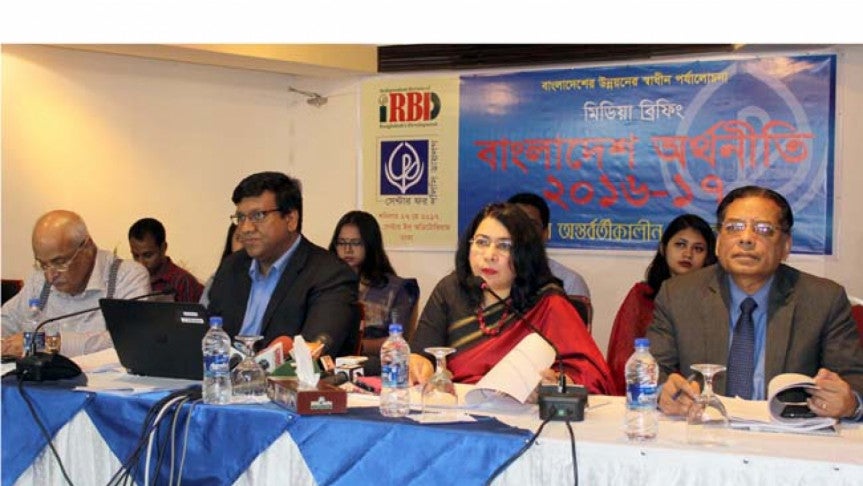CPD for reducing VAT to 12pc

Dhaka: Centre for Policy Dialogue (CPD), a civil society think thank, on Saturday said the VAT rate should be brought down to 12 percent to ease pressure on both producers and consumers.
"If it's not possible to reduce VAT rate to 12 percent at a time, it can be done in phases," said CPD research fellow Towfiqul Islam Khan while revealing its economic assessment report at a press briefing in the city.
In its report titled 'Third reading of the state of Bangladesh Economy in 2017 FY', the CPD suggested the government not to raise supplementary duty for petroleum products, cement and telecom services.
Addressing the briefing, CPD distinguished fellow Dr Debapriya Bhattacharya said no breakthrough is seen in the country's 'stagnant' private investment. "There's no growth in private investment. We're seeing three big signals behind the stagnant private investment."
He said the first signal is illegal outflow of capital from the country. "Now capital flight is now four times higher than foreign assistance. The outflow trend of illegal money rises when the national election gets closer."
About the second signal, he said Bangladeshi entrepreneurs now think that any African country is more attractive than Bangladesh for investment. "They want to export capital from the country, which faces extreme scarcity of investment. So, the private investment sees no growth. It's a big signal for the situation."
The third signal, Debapriya said, Bangladesh is going to reach a very luxurious consumption pattern. "A recent media report said Bangladesh is the fifth biggest market for BMW cars in Asia."
Criticising the current tendency to measure development with only GDP growth, he said the development review that is highly dependent on the GDP growth reflects a very partial and incomplete picture.
Alongside GDP growth, he said, human resource development, balanced distribution of resources and inclusive development should be considered important. "We think the debate over GDP growth is unnecessary. More important to us what changes appear in Bangladesh's economic structure, how many employments are created and how much the marginalised people are benefited."
Dr Debapriya said jobs are not created at the desired level despite economic growth and industrial development as the new technologies that are now imported are more capital-intensive rather than labour-intensive.
The CPD report said the current microeconomic trend indicates a number of disquieting signals, including lower growth in export earnings, decline in remittance inflow, increasing public debt burden, persisting weakness in the banking sector performance and sluggish capital market.
In 2017-18 fiscal year, the cost of production in almost all sectors may experience an upward trend in view of implementation of new VAT and SD act, possible depreciation of exchange rate, rise of wage good (rice price), and yet another round of upward adjustment of the tariffs for electricity and gas, the report added.
The CPD suggested the government to improve the quality of the budgetary framework and strengthen the quality of public investment by setting up a public expenditure review commission, enhance allocation to social sectors, rationalise interest rate on NSD certificates along with the purchasing ceiling and take effective steps for utilisation of the foreign aid in the pipeline for financing the budget deficit, to set up an independent financial sector reform commission.
It also recommended the government to provide adequate incentive to diversify the crop sector and promote poultry, livestock and fishery sectors, and set up an independent Statistical Commission to improve the quality of statistics and remove the inconsistency of data.
Another CPD distinguished fellow Prof Mustafizur Rahman and CPD Executive Director Dr Fahmida Khatun also spoke on the occasion.





